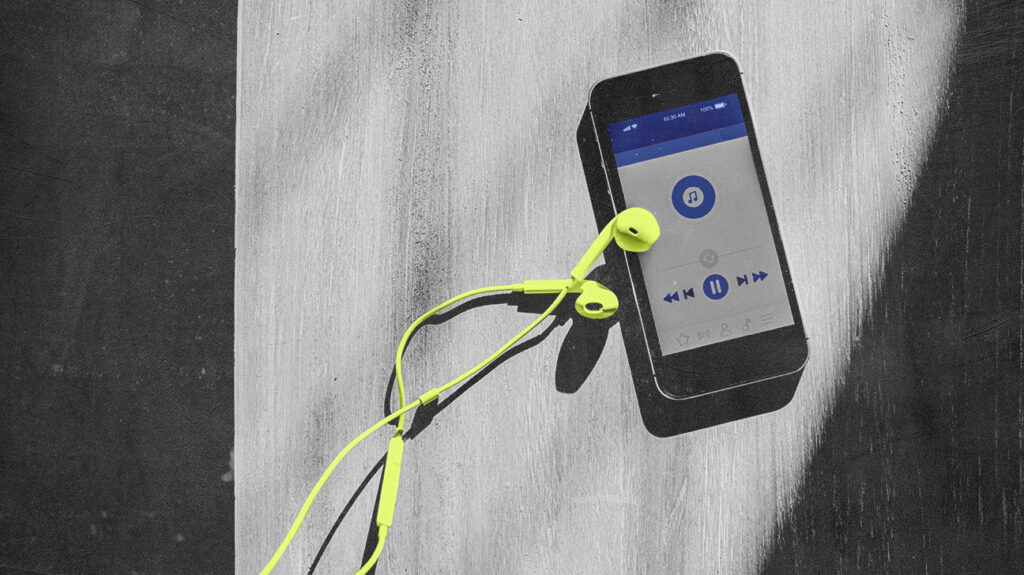
- A new study concludes that music playlists curated by artificial intelligence (AI) combined with “auditory beat stimulation” help alleviate symptoms of moderate trait anxiety.
- A personalized music playlist alone helped significantly reduce symptoms in participants with high trait anxiety.
- Researchers hope their findings will provide simple and cost-effective anxiety treatments for some people.
Over the years, numerous studies have shown the impact music has on improving the symptoms of anxiety and stress.
Now, research suggests that music may help relieve anxiety during surgery and reduce
A recent study into music and anxiety comes from scientists at Ryerson University in Toronto, Canada, who found a combination of AI-curated music and
The researchers hope their findings might provide a simple and cost-effective anxiety treatment for certain individuals. Their results from this study appear in the journal
The authors describe ABS as a “noninvasive neuromodulatory technique, which uses sound waves to produce combination tones, binaural beats, or monaural beats […] with the intention of producing a neural frequency following response.”
By presenting two similar tones, for instance, 400 hertz and 405 hertz, the listener experiences a “modulated wave.”
Evaluating personalized music playlists
Medical News Today spoke with Dr. Adiel Mallik, lead author of the study and a postdoctoral fellow in the SMART Lab at Ryerson University. He explained that the team was trying to determine whether AI-personalized digital music therapy with or without ABS could reduce anxiety.
Dr. Mallik told MNT that while there is scientific evidence demonstrating calm music can be effective in reducing acute stress and anxiety, some theories also suggest the effects may be amplified if the music is personal and reflects an individual’s current mood state.
“Some of my previous work has found that self-selected music can cause the release of neurochemicals
“Outside of music, activation of the opioid system has been shown to have anxiety-reducing effects in both healthy people and in patients [experiencing] anxiety disorders. Taking all of this together, it would follow that music playlists that have been customized to patients’ mood states and preferences would be particularly effective in reducing anxiety.”
Setting up the study
The researchers recruited 163 people with anxiety who were taking anti-anxiety medications. The team randomly placed participants in one of the following treatment plans:
- a combination of music, from a playlist personally created by AI for the participant, and ABS
- music playlist only
- ABS only
- pink noise, which is similar to white noise but less harsh
All treatment sessions occurred at the participants’ homes. Candidates downloaded an app to their iPad or iPhone, which played personalized music therapy, and they listened to a 24-minute session.
Before the treatment session, participants completed the Short Test of Music Preferences, the Eysenck Personality Questionnaire, and the trait version of the State-Trait Inventory for Cognitive and Somatic Anxiety (STICSA).
After the session, contributors completed the STICSA and the Positive and Negative Affect Scale, measuring the effect certain feelings and emotions have on a person.
Using participants’ trait anxiety scores, the researchers split the individuals into either moderate or high trait anxiety subgroups.
Health experts define trait anxiety as “a relatively stable disposition within the individual to judge a wide range of environmental events as potentially threatening.”
Moderate versus high trait anxiety
The researchers found that those with moderate anxiety before treatment started experiencing the largest reduction in somatic anxiety symptoms — or physical signs of anxiety — when listening to a combination of an AI-personalized music playlist and ABS, compared with pink noise.
In people with moderate trait anxiety, this combination also produced the greatest reductions in cognitive state anxiety — when a person’s mental state affects their anxiety.
Individuals with high trait anxiety reported significantly greater reductions in their symptoms when listening to only their AI-curated music playlist.
“In high trait anxiety participants, the music alone condition had a significantly higher anxiety reduction compared to the theta ABS condition, but not the pink noise control condition,” Dr. Mallik explained to MNT.
“Our leading hypothesis is that high trait anxiety participants may require longer and more treatments over time to achieve the same reductions in anxiety across the board as moderate trait anxiety participants.”
“Another possibility,” he continued, “is that high trait anxiety participants may not respond favorably to the theta ABS component of the combined (music and ABS) condition. This might be along the lines of other studies, which have found that people with certain personality traits, such as extraversion, respond more favorably to ABS.”
Research next steps
Dr. Mallik and his research team hope their findings help build a solid evidence base further supporting the use of personalized digital music therapy as an additional tool for reducing anxiety.
Dr. Shara Sand, a private practice psychologist and chief psychologist at the Counseling Center at the Manhattan School of Music, spoke to MNT about this study.
She stated that any intervention that lets a patient feel in control is a positive one. “It allows the person to feel as if they are making a difference in their own treatment, versus the mixed feelings and the side effects produced by medication, that are often an issue.”
For next steps, Dr. Mallik and his team are planning a longitudinal version of this study, where participants take part in multiple sessions across 4–6 weeks or more. “We want to understand how this anxiety-reducing effect of music treatment behaves over an extended period,” he said.
Dr. Sand would like to see replication studies with a more balanced sample. “Women have higher rates of anxiety than men in general, and it would be important to know whether this treatment is effective for both men and women with anxiety.”

